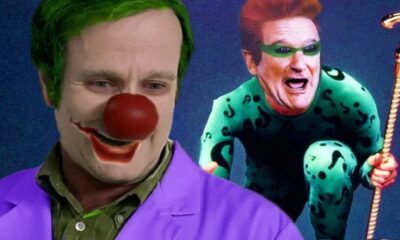Updates
Robin Williams’ widow says ‘It was not depression’ that led actor to take his life
Susan Williams delivers her first interview since her husband’s death last year, revealing that he suffered from a severe brain illness known as Lewy body dementia.
She stated that she did not blame her late husband for taking his own life ‘one bit,’ and referred to him as ‘the bravest man I’ve ever known’
Susan Schneider Williams’ words were her most comprehensive account yet of how the Academy Award-winning actor and comedian suffered before his death in August 2014 at his home in Tiburon, California, north of San Francisco.
“It was not depression that killed Robin,” she told People. “Depression was one of let’s call it 50 symptoms, and it was a small one.”
In the months preceding his death, she and her husband “were living a nightmare,” she added.
“My best friend was sinking,” an emotional Williams told ABC’s Amy Robach in a Tuesday interview.
When comedian Robin Williams hanged himself in his California home in August 2014, the news was met with shock around the world, and the reasons for his suicide have been endlessly speculated upon as colleagues and friends of Williams came forward to claim that depression contributed to his severe mental state.
Susan added: “This was a very unique case and I pray to God that it will shed some light on Lewy bodies for the millions of people and their loved ones who are suffering with it. Because we didn’t know. He didn’t know.”
The difficult-to-diagnose condition causes a gradual decrease in mental ability, as well as hallucinations and muscle stiffness.
Susan Schneider Williams remarked in the interview, “I’ve spent the last year trying to figure out what killed Robin. To understand what we were fighting, what we were in the trenches fighting. And one of the doctors said, ‘Robin was very aware that he was losing his mind and there was nothing he could do about it.’’’
According to his wife, Robin Williams had no alcohol or illicit substances in his system and had been clean for eight years.
Susan told People that the condition began to take hold of the actor in the year leading up to his death, with symptoms intensifying in the months leading up to his suicide.
That may have contributed to the anxiety and despair he was treated for in his last months, and it most likely played a factor in his suicide by hanging in August 2014, at the age of 63.
He had terrible anxiety attacks, a “miscalculation” with a door that resulted in bleeding on his head, and muscular rigidity.
The symptoms, according to Susan Schneider Williams, “present themselves like a pinball machine. You don’t know exactly what you’re looking at.”
What prompted her husband to commit suicide, according to Williams, was “what was going on in his brain.”
“The chemical warfare that no one knew about.”
Williams was diagnosed with Parkinson’s disease three months before his death and was experiencing symptoms such as drooping gait, and confusion, she told ABC’s Good Morning America.
Williams appeared in a number of great films, including Mrs. Doubtfire, Good Morning Vietnam, and Disney’s Aladdin. He earned an Oscar for his supporting role as a psychotherapist in Good Will Hunting, which included a poignant monologue made from a bench in a Boston park where admirers commemorated his passing one year ago this year.
The symptoms of Lewy body dementia are commonly mistaken with those of Parkinson’s or Alzheimer’s disease. The symptoms might overlap, and many doctors are still unfamiliar with the disease. Lewy body dementia affects around 1.3 million people.
LBD develops when normal proteins in the brain begin to collect, producing clumps known as Lewy bodies that, as they spread, “muck up the brain’s ability to transmit signals,” according to Cleveland Clinic neurologist Dr. James Leverenz.
“It’s not just memory, it’s not just movement, and it’s not just behavior. It’s a combination of all three, which makes it difficult to diagnose and difficult to treat,” Leverenz said.
Susan stated that Williams was fully aware he was losing his wits and struggled to hold it together until he reached a breaking point in his final month. “It was like the dam broke,” she recalled.
“If Robin was lucky, he would’ve had maybe three years left,” Susan added. “And they would’ve been hard years.”
Popular Posts:
MUST READ:









































































